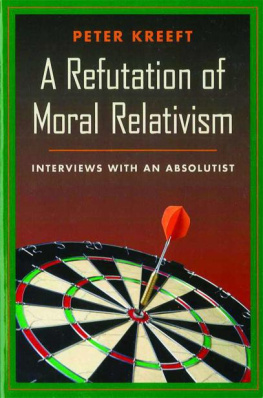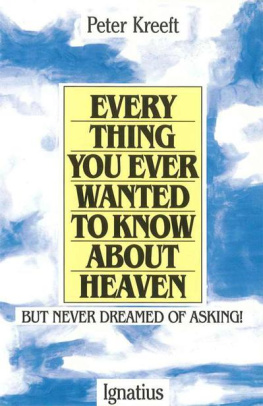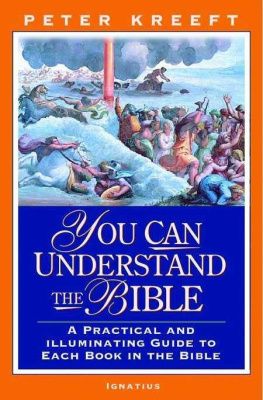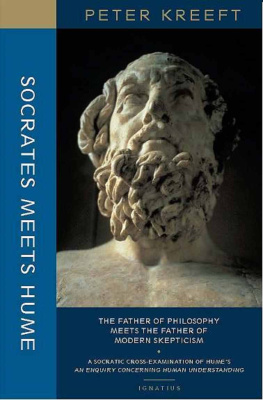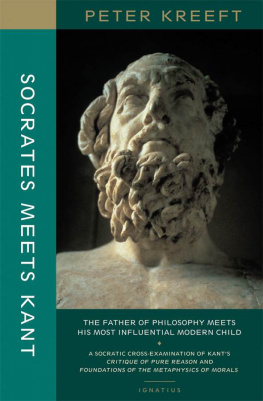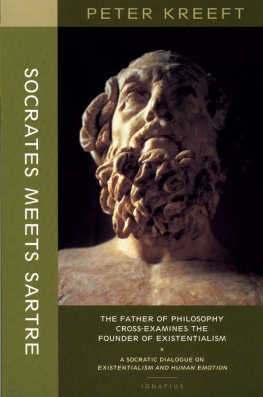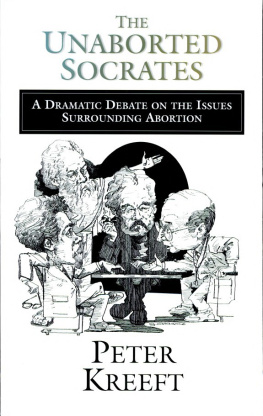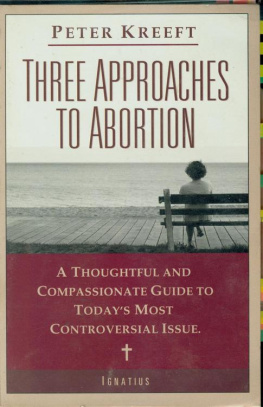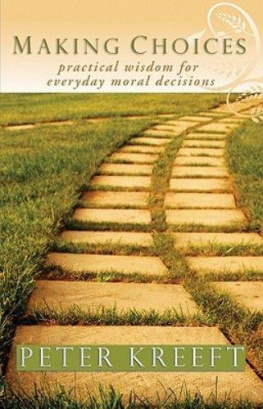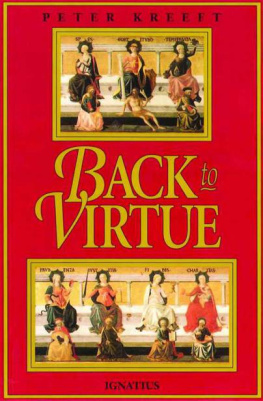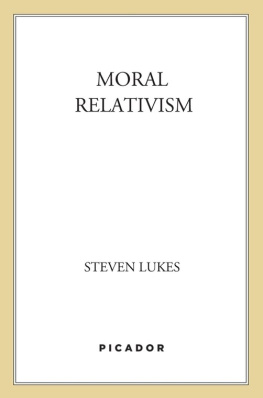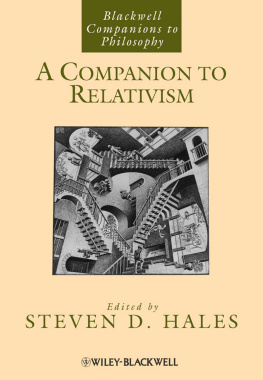A REFUTATION OF MORAL RELATIVISM: INTERVIEWS WITH AN ABSOLUTIST
A REFUTATION OF MORAL RELATIVISM
__________
INTERVIEWS WITH AN ABSOLUTIST
BY
PETER KREEFT
IGNATIUS PRESS SAN FRANCISCO
Cover design by Roxanne Mei Lum
1999 Ignatius Press, San Francisco
All rights reserved
ISBN 978-0-89870-731-1
Library of Congress catalogue number 98-75209
Printed in the United States of America
Dedicated to
Thomas Aquinas,
Moses Maimonides,
and Al-Ghazali
Contents
Interview 1:
Interview 2:
Interview 3:
Interview 4:
Interview 5 :
Interview 6 :
Interview 7 :
Interview 8:
Interview 9:
Interview 10 :
Interview 11 :
Technical Note
All the characters, places, and events in this book are real. However, the author took the liberty of changing the names of the characters and the location of the events. The interviews actually took place not in my house on Marthas Vineyard but in my house in Boston, which is a real place (except to New Yorkers) and in my mind, which is a real mind (except to New Age thinkers). Isa Ben Adam and Libby Rawls really live there, but they have no Social Security numbers, and though I call them by their separate names, others call them both by the name Peter Kreeft.
Introduction
The Title
I hope my subtitle will not suggest parallels to Anne Rices wicked best-seller Interview with a Vampire . But I fear it will, since the image of a moral absolutist that has been branded into our minds by our media is barely distinguishable from that of a vampire. It is something darkly dogmatic and heavybootedly hypocriticala kind of Fundamentalist Fascist.
Let it be so, then. If that is what an absolutist is, then interviewing one should be as fascinating as interviewing a vampire. Come, then, to the freak show. Buy this book, your admission ticket to peer into the weedy deeps of the psyche of the monster: Swamp Thing, Grendel, Nessie. See the last dinosaur before the species becomes as dead as the dodo.
The Characters
I do not know quite how to classify this book: interview, conversation, or debate? It is a series of dialogues between two of the most fascinating and delightful friends I have ever had the great good fortune to meet.
Isa Ben Adam, the interviewee, is a forty-one-year-old Palestinian Arab who is a Professor of Philosophy at the American University in Beirut, Lebanon. However, I cant call him Professor, as his interviewer does; Ive always called him Isa. I met him in 1978, when he was my student at Boston College. He is probably the most brilliant student I have ever taught, and certainly the most interesting. I see him as an integrated multiple personality made up of equal parts of Doctor Samuel Johnson, Malcolm Muggeridge, Alexandr Sokhenitsyn, G. K. Chesterton, Hilaire Belloc, Judge Robert Bork, and Alasdair MacIntyre.
I want to call Isas mind a knife, but a knife cant be both blunt and sharp at the same time, as he is. Formidable is the word that pushes forward out of the mass of adjectives that compete to describe him, but pronounced with properly Frankish gravity and awe: foer-mee- dah -bl! He does not suffer fools gladly, and Americans tend to find some of his mannerisms impolite and insensitive. However, though gruff or even cantankerous, he is far from humorless. (He was at Oxford for a time, and I think his soul is still there.) Many people, including his interviewer, find him arrogantand if he had not suffered much when he was younger, he would probably be insufferable; but I find him humblehumble enough to forget about his appearance or persona and attack the issue or the argument like a warrior. If people were elements, Isa would be fire. (Perhaps that is why he is so in love with water and the sea.)
The interviewer, Liberty (Libby) Rawls, is a journalist who has been called a classy, sassy Black feminist. She has lived as much as Isa has thought , having been a wife, a psychological social worker, a surfing instructor, an actress, an alcoholic, and a private investigator, as well as a journalist. She has known Isa since 1978, when they and seven others shared a rooming house in Nahant, Massachusetts. Both Libby and Isa credit its owner, Maria Kirk, with saving their lives. But thats another story.
Libby and Isa had many conversations at that housemore accurately, many heated arguments ending with slammed doors more often than with syllogisms. Both are now supposed to be in their professional mode, but their personal history continually peeks throughwhich is exactly what I foresaw and calculated would add a bit of personal drama to the argumentative drama. So I persuaded them to record these interviews by the bribe of a week of great swimming, fishing, sailing, and surfing at the prettiest little four-room Victorian gingerbread cottage (The Purple Angel) on the prettiest island in the world (Marthas Vineyard).
The interviews were tape recorded there during the summer of 1998 (a twenty-year-later anniversary party) and transcribed into this book with nothing added or omitted. They are more like an argument between friends than the typical journalists interview of a celebrity, in which the journalist is either a lapdog or a vulture. Libby is no match for Isa in philosophical debate, but neither is she a mere journalist. Her mind is sharp and her questions pointed and honest. They are the questions most people have about moral absolutism, whether they read Platos Republic or the National Enquirer .
The Topic
The question discussed is: Are there moral absolutes ? Three groups of people will find these interviews of great interest:
1. Anyone perceptive enough to realize that the issue may be the single most crucial issue of our time, the most practical issue, since it makes the greatest difference to our lives. Nothing more radically distinguishes our culture (the modern West) from all others in human history, including the premodern West as well as contemporary non-Western cultures, whether Islamic, communist, or primitive. Most of our cultures intellectual leaders find the moral absolutisms of all these other cultures not only false but also dangerous, while these other cultures, in turn, find our relativism and scepticism of their moral certainties not only false but also dangerouslike a giant without a conscience. That is why many pious (and impious) Muslims call America the great Satan.
2. Anyone who wonders what respectable logical arguments (as distinct from prejudices, fears, or provincialisms) could possibly be given by an absolutist to defend his outdated philosophy. Isa Ben Adam may be right or he may be wrong, but he is certainly very clear and very intelligent.
3. Anyone interested in the psychological dimension of the issue, for the two positions are here incarnated in two characters who seem typical of the two different philosophies. The interviewer is liberal, sceptical, tolerant, and openminded. (An absolutist would probably call her philosophy wishy-washy.) The interviewee is very conservative, convinced, and uncompromising. (A relativist would probably call him dogmatic and intolerant.) Beneath the mutual insults there is much more friendship and respect between these two individuals than there usually is between the two groups they represent, and they got along much better in real life (in the house, on the beach, in the boat) than appeared in these interviews.
Interview 1
The Importance of Moral Relativism; Will It Really Damn Our Souls and End Our Species?
Libby: Is the tape running?
Kreeft: I cant guarantee that. I probably pushed the wrong button. Any machine more complicated than a pen spooks me out.
Libby: Here, let me see. Its OK. My goodness, Dr. Kreeft, dont you use a computer?
Next page
